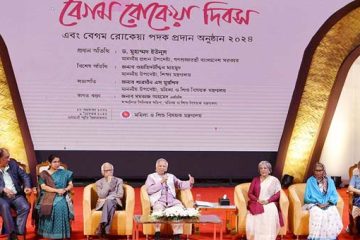Climate Change
Global forums ignore impacts on agriculture
Agriculture has not been given enough priority in the global forums on climate change although it is the most vulnerable sector, said environment experts, economists and journalists at a discussion yesterday.
They said intrusion of saline water and irregular cycle of seasons due to global warming would seriously affect farm production putting lives at stake. It is imperative that Bangladesh puts special emphasis on agriculture in climate change negotiations.
The observations came at a workshop on “climate change effects on Bangladesh agriculture and threats to food security” organised by Forum for Information Dissemination on Agriculture (FIDA) at the Jatiya Press Club.
Agronomist Mahabub Hossain said the government does not seem committed enough to address the climate change issues. “The politicians assume power for five years. So they are more for short term plans rather than that of 50 or 100 years’,” he added.
Farmers do not get adequate rain in the rainy season while winter is more intense and depression in the Bay of Bengal is frequent, said Mahabub Hossain, also executive director of Brac.
Scientists have already developed some submergence and saline-tolerant rice varieties, which however are not enough, he said emphasising more improvement of the stress-tolerant crop varieties.
As there is a forecast that 17 percent of the coastal area will go under water in 100 years with one meter rise in the sea level, the government should think of high cluster housing in coastal areas and growing fish in the brackish water, he said.
Ainun Nishat, vice chancellor of Brac University, said the global community has agreed to keep the planet’s average temperature at 17 degrees Celsius, which is 2 degrees Celsius higher than the pre-industrial era. The agriculture would be seriously affected even with this effort, he noted.
Abrupt rains, frequent floods and cyclones will affect pollination and thereby life cycle of plants and animals, said Ainun Nishat.
The stress-tolerant crop varieties are reaching the farmers at a limited scale. This process should be sped up, he said, adding a crucial factor for agriculture is management of water through effective embankment and improved irrigation.
He suggested capacity enhancement of relevant ministries to tackle the climate change impacts.
State Minister for Environment and Forest Hasan Mahmud said Bangladesh now produces three times more food than it did in 1972, but the ever-growing population and loss of arable land is alarming.
With the help of agriculturists, farmers and policymakers the country is sure to prosper, said the state minister.
Professor Anisul Islam of a US university, Syngenta Bangladesh’s Managing Director Sarwar Ahmed and FIDA General Secretary Khwaza Main Uddin also spoke at the programme chaired by FIDA President Kawser Rahman.




















